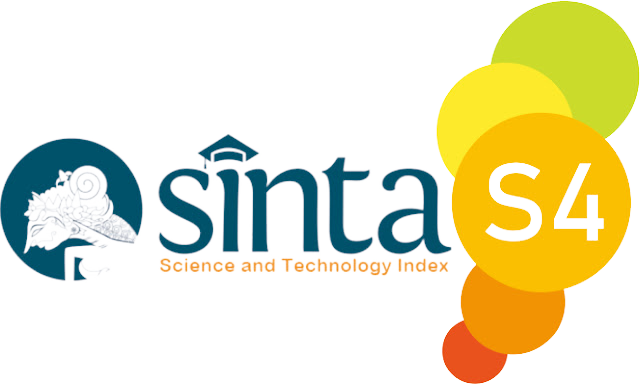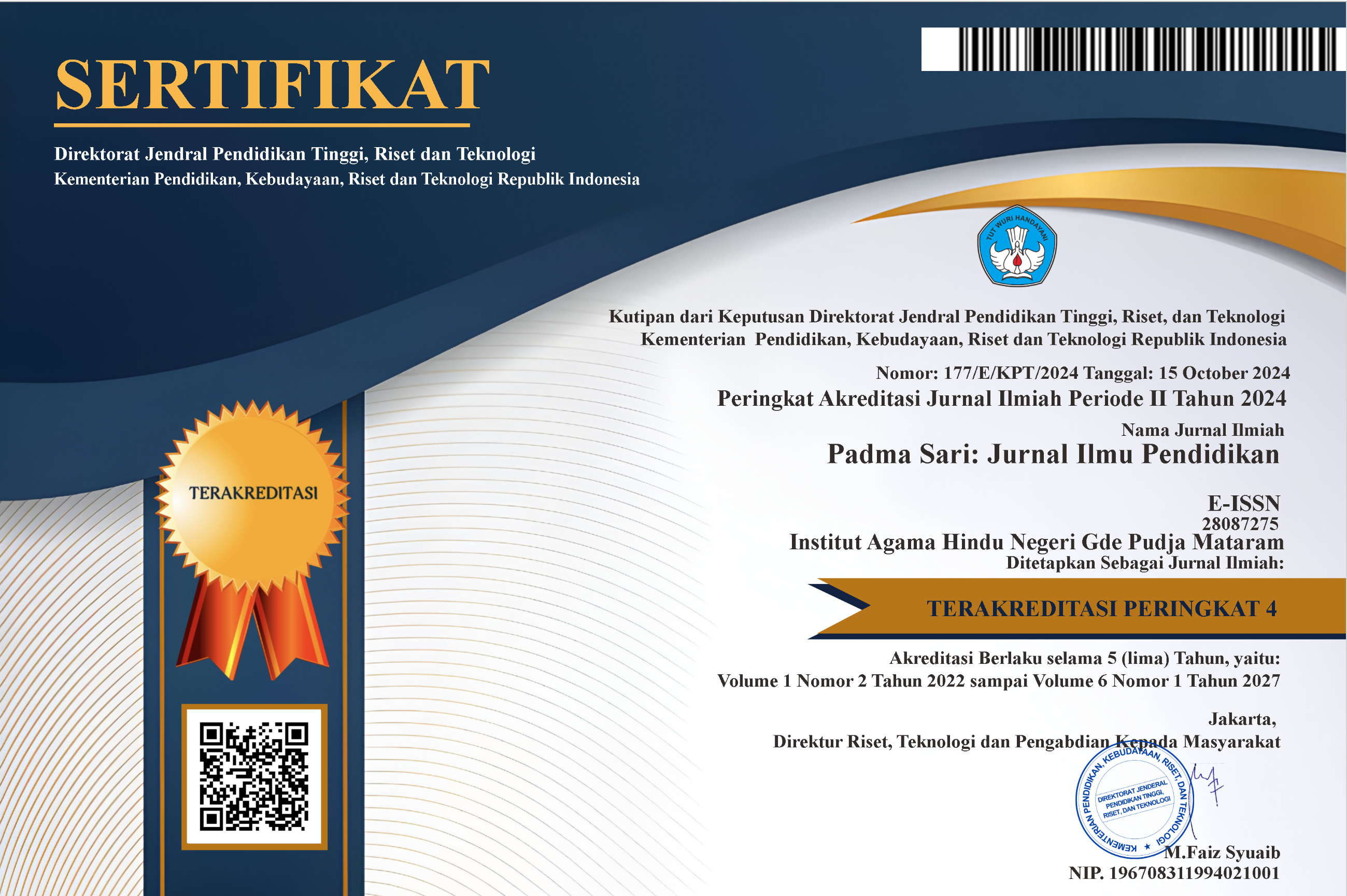BUILDING RELIGIOUS MODERATION FROM AN EARLY AGE: A CASE STUDY OF LEARNING STRATEGIES IN PASRAMAN SWASTA PRANAWA
Abstract
The discourse of religious moderation in non-formal religious education is becoming increasingly relevant amid the challenges of diversity and increasing symptoms of social intolerance. This article aims to analyse learning strategies for building the values of religious moderation at an early age in Pasraman Swasta Pranawa in Mataram City. This research uses a qualitative approach with a case study method through observation, in-depth interviews, and documentation studies. The findings indicate that the dominant strategies for effectively internalising the values of tolerance, respect for differences, and social harmony are effective and contextual approaches. The example of Acarya, along with the local Hindu values-based approach known as Tat Twam Asi, plays a significant role in shaping Sisya moderate character. This article contributes to the development of a character education model based on spiritual values and local culture in the realm of Hindu religious education. The results of this study affirm the urgency of strengthening moderate learning strategies in non-formal religious institutions as part of multicultural education in Indonesia.
References
Anwar, R. (2024). Tinjauan Literatur Tentang Pengaruh Stres Kerja Terhadap Keselamatan Dan Kesehatan Kerja Di Lingkungan Industri. Ecohealth: Jurnal Inovasi Kesehatan Lingkungan Dan ….
Badan Litbang dan Diklat Kementerian Agama RI. (2019). Tanya Jawab Moderasi Beragama Kemenag.
Baidhawy, Z. (2013). Building harmony and peace through multiculturalist theology-based religious education: An alternative for contemporary Indonesia. In Peace education and religious plurality (pp. 1–16). Routledge.
Bhusana, I. W. H. D., & Gara, I. W. (2024). The Suboptimal Process of Teaching and Learning Hinduism in Java. International Journal of Multidisciplinary Sciences, 2(1), 97–109.
Bond, M. H. (1998). Unity in diversity: Orientations and strategies for building a harmonious, multicultural society. Trames, 2, 234–263.
Dwintari, J. W. (2018). Urgensi pendidikan kewarganegaraan berbasis multikultural dalam pembinaan keberagaman masyarakat Indonesia. Civic-Culture: Jurnal Ilmu Pendidikan PKn Dan Sosial Budaya, 2(1).
Misrawi, Z. (2013). Kesadaran multikultural dan deradikalisasi pendidikan Islam: pengalaman Bhinneka Tunggal Ika dan Qabul al-Akhar. Jurnal Pendidikan Islam, 2(1), 197–215.
Mubit, R. (2016). Peran agama dalam multikulturalisme masyarakat Indonesia. IAIN Tulungagung Research Collections, 11(1), 163–184.
Muzayana, I. (2024). Systematic Literature Review on the Implementation of the Pesantren Muadalah Certificate Policy in Indonesia. Kharisma: Jurnal Administrasi Dan Manajemen Pendidikan, 3(2), 112–125.
Nathan, K. S. (2009). Harmony in government–society governance: Problems, challenges and prospects in Malaysia. Governance for Harmony in Asia and Beyond, 103–123.
Rahayu, N. W. I., Al Ahsani, N., & Suroyya, D. (2024). Distorting Extremism through Acceptability and Exploring Hindu Cultural Celebrations in Jember, Indonesia. Journal of Islamic Civilization, 6(2), 135–146.
Raihani. (2014). Creating a culture of religious tolerance in an Indonesian school. South east Asia Research, 22(4), 541–560.
Ramstedt, M. (2005). Introduction: Negotiating identities—Indonesian ‘Hindus’’ between local, national, and global interests.’ In Hinduism in modern Indonesia (pp. 1–34). Routledge.
Ramstedt, M., & Ramstedt, M. (2005). Hinduism in modern Indonesia. Taylor & Francis.
Rozi, M. F. (2017). Pluralisme Danmultikulturalisme Dalam Membangun Masyarakat Madani; Kajian Paradigmatik. Al-Ibrah: Jurnal Pendidikan Dan Keilmuan Islam, 2(2), 104–127.
Saihu, M. (2020). Unity In Diversity (Humanism-Theocentric Paradigm Of Social Education In Indonesia). GlobeEdit.
Saihu, M., Umar, N., Raya, A. T., & Shunhaji, A. (2022). Multicultural education based on religiosity to enhance social harmonization within Student: A study in a public senior high school. Pegem Journal of Education and Instruction, 12(3), 265–274.
Siswadi, G. A., Candrawan, I. B. G., & Puspadewi, I. D. A. (2024). Membangun Nilai-nilai Moderasi Beragama di Tengah Masyarakat Plural: Sebuah Pendekatan Filsafat Agama. Widya Aksara: Jurnal Agama Hindu, 29(2), 1–13.
Sueca, I. N., Arini, N. W., & Adnyani, N. W. S. (2023). Character Education Based On Religion And Local Wisdom. Vidyottama Sanatana: International Journal of Hindu Science and Religious Studies, 7(2), 279–288.
Suryani, A., & Muslim, A. B. (2024). Religious tolerance, intellectual humility, and democratic education. In Embracing diversity: Preparing future teachers to foster religious tolerance (pp. 13–34). Springer.
Suryatni, L., & Widana, I. (2023). Perception and appreciation of the Indonesian plural society toward cultural diversity. Technium Soc. Sci. J., 43, 466.
Umayyah, N. (2024). Islamic Religious Education And The National Education System Law. QALAM: JURNAL PENDIDIKAN ISLAM, 5(1).
Wiguna, I. B. A. A., & Andari, I. A. M. Y. (2025). Internalization of Religious Moderation Values in Learning Strategies Within Pasraman Non-Formal Education in Mataram. Jurnal Penelitian Agama Hindu, 9(3), 68–87. https://doi.org/10.37329/jpah.v9i3.4115
Zuhri, S., & Sibaweh, I. (2023). Revitalization of the Salaf Islamic Boarding School: The Educational Identity of the Indonesian Nation. Eurasian Journal of Educational Research (EJER), 107.

This work is licensed under a Creative Commons Attribution 4.0 International License.




















